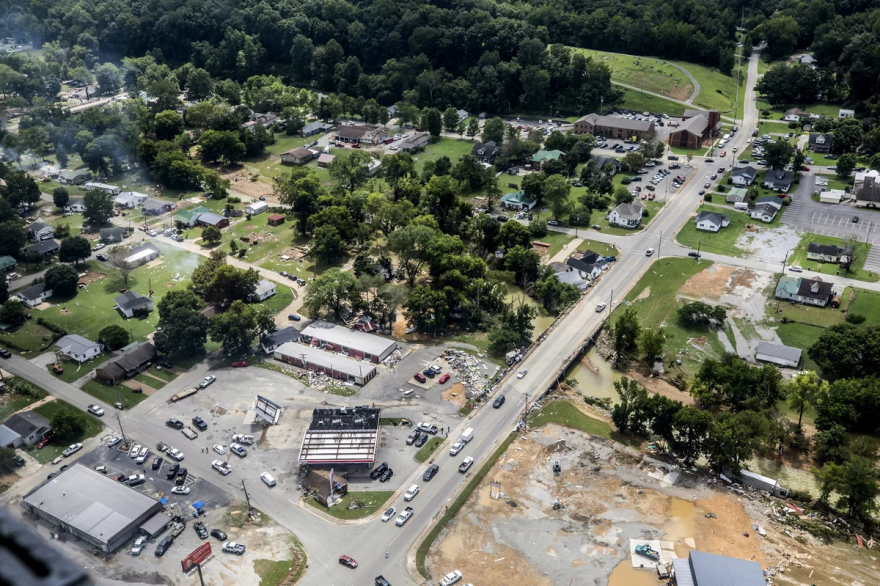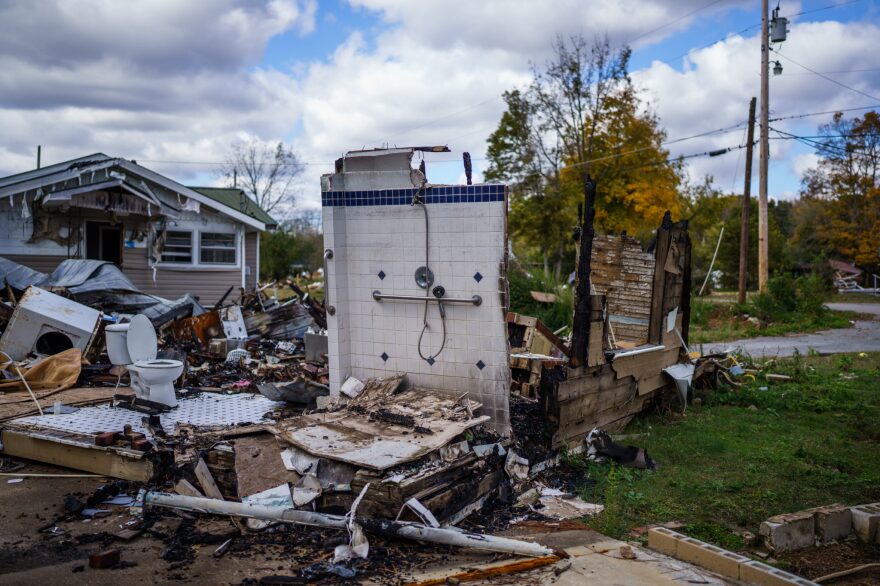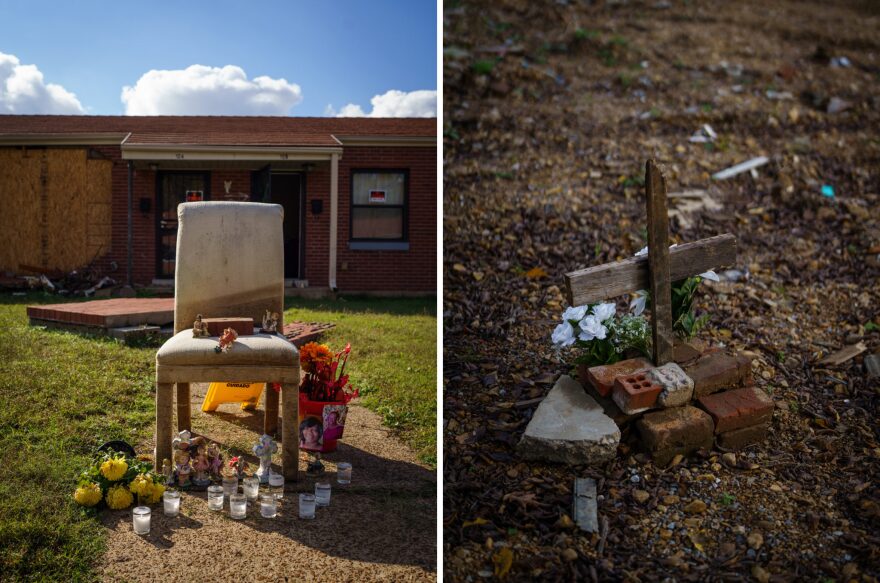Two weeks after the flood, after the water smashed through apartment buildings down the road, after it wrecked the local supermarket and two schools, and carried off cars like bathtub toys, Gretchen Turner sat in a chair on her porch taking advantage of the moment she finally had alone to catch her breath.
The initial trauma from the flood had started to fade. And the rapid-fire questions that people bombarded her with began to slow down.
The rain had started early on Aug. 21, and it was heavier than Gretchen had seen in a long time. She got worried when water swept into her backyard, then over the patio. By 9 a.m., the water began rushing into the house. Gretchen and her daughter, Zoe, ran to the second floor with their cats, family albums and paintings. Cellphone service in the area became spotty, but she was able to send a few text messages telling her husband, Danny, that she and Zoe were OK.
“It just came in so fast,” Gretchen said. “It was crazy.”

When the rain finally stopped and the water receded, 20 people, including several children, had been killed by the flash flooding. The Turners’ home had filled with 2 1/2 feet of floodwater. Now the house was uninhabitable. The entire first floor had to be gutted. The floors and walls were stripped, and on this day, a bit of soft sunlight filtered through the cracks.
The debris from Gretchen’s house and her neighbors’ places was stacked in front yards. People who had been displaced flowed in and out of churches that were converted into shelters and supply centers. The streets were packed with National Guard trucks and hundreds of volunteers looking to help.
Gretchen was calm, despite everything swirling around her. But her mind kept going over the same things without any real answers: How did this happen? Who would be in charge of the cleanup? Does it make sense to rebuild?
“None of my neighbors had flood insurance. We weren’t in the flood plain. It wasn’t required,” Gretchen said. “And if we could have gotten it, it was going to be around $600 a month.”

The Turners were one of thousands of families displaced in 2021 by extreme weather events across the country, from wildfire to hurricanes to floods. Nearly two dozen climate-driven extreme weather events hammered the United States. The disasters killed hundreds of people and did more than $145 billion in damage.

Like other displaced Americans, the Turners have spent months trying to decide whether they should rebuild, now that their home was ruined. The choice was painful and complex: They could rebuild in their hometown, which faced a regular threat of flooding, or move someplace safer and leave behind the life they built in Waverly.

How climate change hit a small town
Waverly, which is about an hour and a half west of Nashville, had just more than 4,000 people before the flood. Gretchen’s block is tucked into a neighborhood between a wooded area and Trace Creek. With all the birds singing and insects humming, there’s more nature here than streetlights.
Last August, nearly 21 inches of rain fell at the wastewater treatment plant in McEwen, Tenn., in 24 hours, about 10 miles east of Gretchen’s home. The rainfall broke Tennessee’s previous record. Trace Creek overflowed. The catastrophic flooding wiped out entire apartment buildings and businesses. Blocks of people in Gretchen’s neighborhood were displaced from their homes. Nearly everyone knows someone who lost a home or died in the flood. Some people left town with no plans to come back.

For Gretchen, deciding whether to leave Waverly would be tough, even after such a catastrophe. She serves on the county arts council. She’s an active member of the Waverly United Methodist Church. She sells antiques on eBay and at a local vintage shop. She can hardly walk through town without being stopped by another resident, like a kind of local celebrity.
“We love our neighbors, our churches and our organizations,” Gretchen said. “It’s a pretty tightknit community.”
Leaving Waverly would mean uprooting Zoe during an already complicated senior year in high school. It would mean moving farther away from her mom. She lives a few homes down from Gretchen and her home was barely touched by the flood. But leaving would probably be the best way to cut the risk of her home flooding again.

For many survivors of extreme weather disasters, rebuilding is a costly investment. It’s also a financial risk that Gretchen was reluctant to take on. She contemplated following the lead of residents who left Waverly. She had lingering questions about the risk of rebuilding in a flood-vulnerable town after so much death and destruction.
“My husband literally retired on Sunday. And we have X amount of dollars in our retirement fund to last us the rest of our lives,” Gretchen said. “We can’t take a significant part of that out to invest in our house — without some assurance that this is not going to happen again.”
Almost all of Gretchen’s everyday life was disrupted. Piles of debris became a normal part of the scenery. The town’s only neighborhood supermarket where Gretchen shopped, Waverly Cash Saver, was wiped out. Like many of the store’s loyal customers, she had to drive to the next town over to buy food instead of going to the local Walmart.

With no place to go because no one would allow them to bring their cats, Gretchen and her family moved in with a friend while they weighed starting over in a new city. They felt lucky. But it was a space that didn’t have the things the family was used to, like a TV.
There was also less privacy. Many of the belongings they saved from the house were placed in storage, but at the friend’s home, their day-to-day things were packed in bins. Zoe and Danny also shared a small dresser.

The flood dashed hopes of a normal year
While Gretchen and Danny weighed the family’s options, Zoe had begun to let go of her hope that she’d finally have a normal year in high school. Living with a family friend killed any chance of that. Before the flood, she spent her time in school dealing with COVID disruptions.
“Well, we brought our cats and that helped me a lot,” Zoe said. “Because having like, your, I guess, feline friends around, made you feel like you had to take care of them. Something about that made it easier to adjust.”
Zoe is originally from China. She was adopted by the Turner family. She attends Waverly High School. She’s also a star student with a perfect GPA.
Outside of school, Zoe kept herself busy with color guard practices. They gave her brief glimpses of normalcy. She was able to spend time with friends and step back from the reality of the flood — although some of her friends’ lives were changed by it too.
But when she got home at night, she was right back to thinking about the rebuild.

“I guess it’s difficult because I can kind of be involved, but in the end, I don’t make the final call on anything,” Zoe said. “So, I kind of just have to go with the flow. And that’s a little bit difficult sometimes.”
After a few weeks of being displaced, the Turner family came up with a compromise to staying or going: turning their flood-damaged garage into an apartment.
They were already planning to remodel the garage before the flood as an apartment for Gretchen’s aging mom to be closer to them. The fact that they’d already discussed the renovation before made it easier now to quickly settle on the compromise. The family looked at a garage makeover as a less-high-stakes option that would allow them to stay in Waverly.

Gradually, a community gets rebuilt
About two months after the flood, the Turners were among hundreds of Waverly residents who gathered downtown to celebrate Halloween. It was the first time so many people met up in the same place without their volunteer hats on.
Local shops, including the vintage store where Gretchen had a vending booth, opened their doors to trick-or-treaters dressed in princess and superhero costumes. The owners set up rows of tables piled with candy. Hardly anyone talked about the flood. They complimented each other’s costumes and marveled at the large turnout.
Parking lots became spaces where kids ate candy and hot dogs and visited face-painting stations. Emergency lights from police cars and firetrucks illuminated the area. Gretchen and Zoe gathered with others for a ghost story told by a local park ranger.
“So Ranger Bob runs the Johnsonville State Historic Park,” Gretchen explained, as she strolled through the street. “And he’s like Ranger of the Year, forever.”

The evening was one of the first chances for Waverly to find normalcy after the flood. Soon after, the Turners reached a milestone of their own. The family hosted Thanksgiving at Gretchen’s mom’s house.
The dinner was just after a team of volunteers began working on their garage. The workers installed drywall and green board, a material made for high moisture. It was the first step to completing the family’s temporary apartment.
So, when nearly a dozen friends and family members met up for the feasting holiday, there was plenty of good news to deliver about the garage. Gretchen shared it over pots of green beans, smoked turkey and asparagus casserole.
Gretchen’s son, Jackson Turner, was home too, which let them talk more about the flood and the rebuild.
“I guess we feel a little guilty. I’m never really here,” Jackson said. “And so I felt like, well, the first thing that I wanted to do was come out and help.”
“And you did,” Gretchen replied.
“Well, not immediately,” Jackson said.
It took Jackson a couple of days to get to Waverly after hearing about the flood. He had been away at college. He’s enrolled in a Ph.D. program at the University of Tennessee, Knoxville. The college is four hours east of Waverly.
“It’s very sobering that I can just hear that all of this is going on. Even though I can check out and go back to Knoxville and have my own life there,” he added. “The flood is still around and it’s going to be around for a long time.“

Sticking around despite the threat of more floods
Taking on a new construction project was a big challenge for the family. It kept frustrating Gretchen. Repeated maintenance delays and canceled appointments took their toll on her. She felt that the family would never be able to regain the peace of mind that was stripped away from them.
Then there was the financial burden.
“My biggest challenge is trying to stay positive and not worry about all the money we’re spending,” Danny said. “It seems like there’s something new all the time.”
The family had spent thousands of dollars making their garage home a reality. The tab for some of the contract work and appliances scaled to tens of thousands of dollars. They didn’t have flood insurance but received financial support from the Federal Emergency Management Agency and from friends and family.
They had put off the harder and more costly decision to jump into a rebuild of the big house, which Gretchen said would cost at least $100,000.

But making a risky investment is a necessary process that many flood survivors are forced to endure. And in the Turner family’s case, Gretchen thought she had an obligation to stick around, as opposed to moving to Knoxville, where Jackson is and where Zoe will eventually be for college.
“They don’t need me there,” Gretchen said. “I think the community needs me here.”
But there’s still the uncertainty of more extreme weather occurring in the future. Tennessee has a history of flooding. There were more than 2,800 floods in the past two decades. The state has an annual flood tab of about $243 million. Waverly itself had two major floods in 2010 and 2019. But neither of them had been destructive enough to change the lives of the Turner family — and their neighbors.
Climate scientists say global warming is leading to heavier rainfall events and that they are becoming more intense. In 2020, a state report by the Tennessee Advisory Commission on Intergovernmental Relations stated that there could be “an increase in damage from flooding, heavy rain, and other hydrologic events from $243 million per year currently to $346 million per year.”
It’s a constant worry for Gretchen and the town’s flood survivors. “If we could get some answers, it would give people more confidence to come back,” Gretchen said.

Nothing is guaranteed, she explained, but Gretchen said it would help to know that officials at all levels would at least do something to address flooding.
“I’m still reaching out to elected officials, and FEMA, TEMA, and the Army Corps [of Engineers]. I know they’re probably not going to tell me anything, but I’m still going to bug them,” Gretchen continued.
How the family moves toward certainty
By mid-December, the Turner family had finally started making real progress. The family was starting to see a glimpse of recovery. And so was the community around them. The grocery store that Gretchen relied on was back up and running. The reopening drew crowds of people who packed the parking lot even before the doors opened. Families were getting closer to returning to their flooded homes.
Federal agencies dished out millions of dollars in disaster loans and other assistance to aid in the recovery process. Local donors and regional nonprofit groups also gave their share of dollars to flood-affected residents.

But a full recovery is still a long road ahead. There are still flood-damaged homes, businesses and cars that look untouched.
In Tennessee, officials have begun to express concern about future flooding, but they can’t guarantee that it won’t happen again. It’s an impossible promise to make while government agencies are still reviewing what happened. That’s part of the reason why Gretchen hasn’t heard anything back about concrete flood mitigation plans.
Many residents say they would at least like someone to clean out and deepen the local creek — although that may not be enough to protect them from another historic rainfall.
After the flood, a coalition of Tennessee mayors called on state legislators to make statewide investments in flood-proof infrastructure. This year, the U.S. Army Corps of Engineers also announced that it would be conducting a flood plain management study of Trace Creek in Waverly, which flows through Humphreys County.
In January, the Turner family moved into their new space. It’s smaller than the first floor of the family’s home, but big enough for two bedrooms, a closet, bathroom and kitchen. The white-walled apartment has an open floor concept. Plenty of natural light blares through the windows.
The family spent the first day in the new space assembling furniture and completing other small tasks. They washed a load of dishes and bedsheets. The biggest excitement was regaining their personal space.
“I’m really excited to have my own space, my own room to relax in,” Zoe said, as volunteers worked on the final touches of the new garage home. “I’m an introvert, so it’s really nice to cool down after a busy day at school.”
The space has everything that a small family would need to feel comfortable. They have working appliances. But they’re still waiting on a sofa, countertops and a few other items to arrive.
Still, regaining a piece of what the family lost in the flood is an important milestone — although it’ll be hard for them to feel whole as long as their longtime home is still damaged. They’ve decided to rebuild it and started meeting with case and construction managers to begin the repairs.

It’ll take at least a year to complete. By that time, Zoe will be at college and away from town. That’ll leave Danny and Gretchen with the task of figuring out how to move life in Waverly forward.
“As far as closure, I don’t think we have it yet,” Gretchen said. “I don’t think we will have closure until everything is done — or close to done.”




